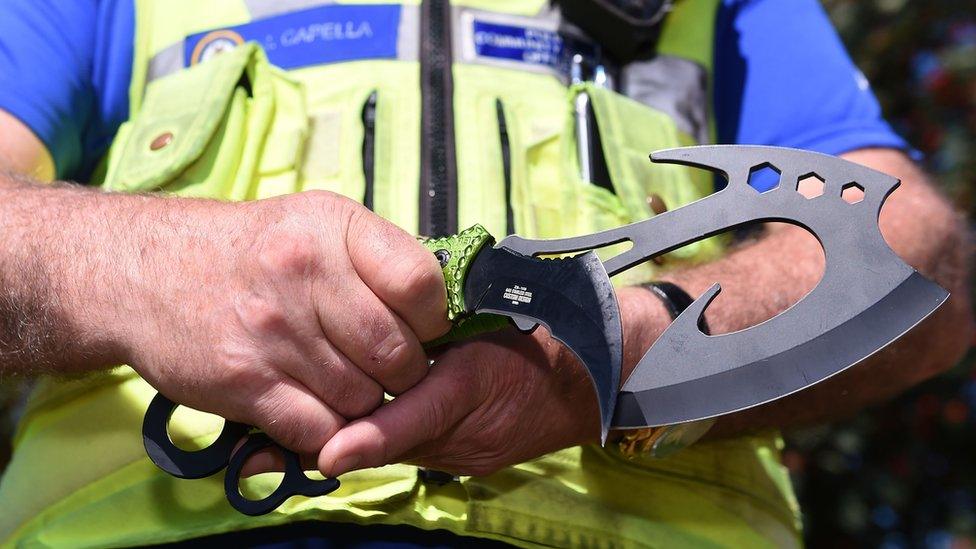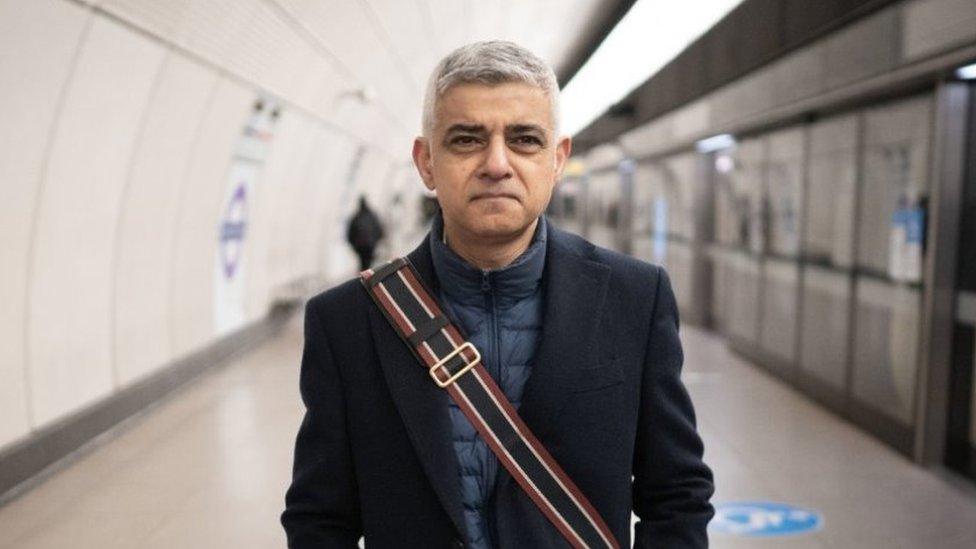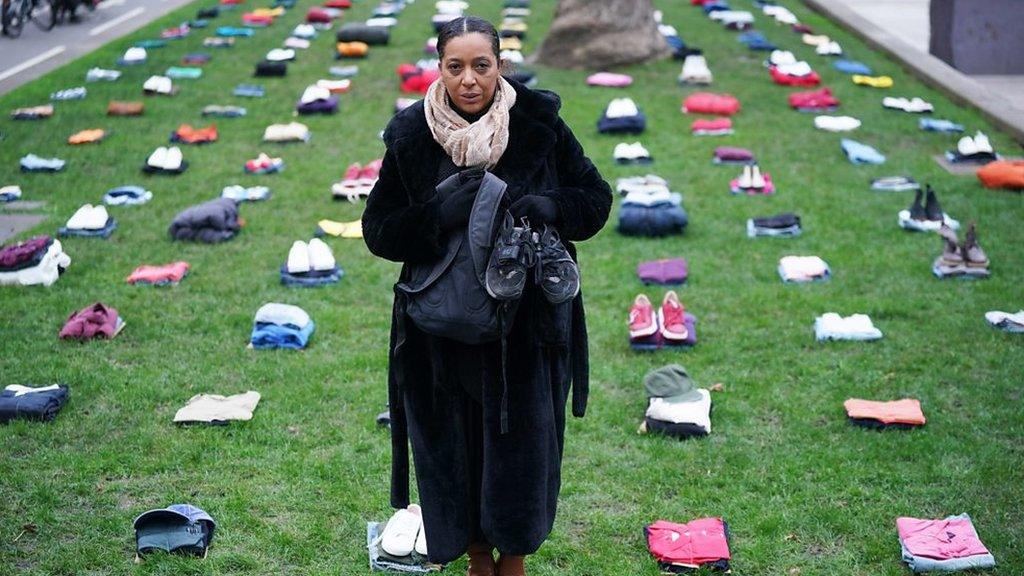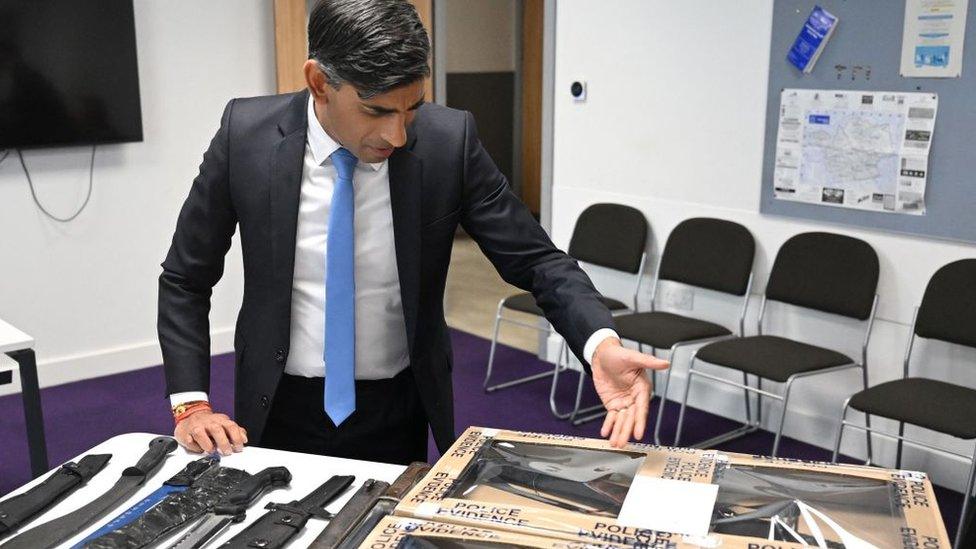Idris Elba warns against mandatory jail for carrying knife
- Published

Actor Idris Elba says there is no "one size fits all" answer to tackling knife crime, after victims' families urged mandatory jail terms for possession.
Dr Sinead O'Malley, whose daughter was killed in Nottingham last year, has called for compulsory prison sentences.
Elba said deterrents were crucial, but that some people carry knives out of fear.
It comes as the government announced plans to close "a legal loophole" to ban the sale of zombie knives.
Speaking to BBC Breakfast, Elba said many young people - usually young men - carry knives because they are scared, because they have been stabbed themselves, or have seen someone else stabbed.
"He's walking through a neighbourhood, and thinks I'm going to protect myself here - he ends up in jail for five years. You wonder, are we winning?", The Wire and Luther actor asked.
Elba added that a deterrent to make young people know they will pay a penalty for carrying a knife is important - but argued there are "gradients" to the issue.
"As a deterrent it's a really important step to consider, but it's not one size fits all," he said.
Elba, a prominent campaigner on knife crime, said that in tackling the issue it was important for the experiences of young people not to be overlooked.
"We do not want to criminalise these people without offering them an opportunity to feel safe, to feel that their whole community is involved," he said.
In a highly emotional interview with the BBC on Wednesday, Dr O'Malley, a consultant anaesthetist, said carrying a knife was "no different" to carrying a gun.
She said: "I believe there has to be mandatory prison sentences for carrying a knife.
"It is not just an offensive weapon or something you could eat your food with. It is a lethal weapon."
In the same interview, her husband, Dr Sanjoy Kumar, a GP, described knife crime in England as an "epidemic" and said existing legislation on the issue appeared "easy-going".
Watch: In an emotional interview, Grace O'Malley-Kumar's family say they are "dizzy with grief"
On Thursday, the government is planning to introduce a new law further clamping down on zombie-style knives by closing what it describes as a legal loophole.
Previous attempts to ban the weapons defined them as having a cutting edge and a serrated edge and "images or words that suggest that it is to be used for the purpose of violence".
But the new law will also ban zombie knives with no threatening words or images, the Home Office said.
This is the government's third attempt at banning the weapons since 2016.
A new definition was added in 2019 covering "cyclone knives", with two spiralled blades.
The new rules are being introduced to Parliament on Thursday, although they will not take effect until September.
Amendments to the Criminal Justice Bill will also:
Raise the maximum sentence for the possession of banned weapons - from six months to two years
Give police the power to seize and destroy knives found in homes, if there are reasonable grounds to suspect they will be used for serious crime
The latest police-recorded crime figures for England and Wales, external show that offences involving knives or sharp instruments increased by 5% to 48,715 in the year ending September 2023 - but they remained 5% lower than the year ending March 2020, at the start of the Covid-19 pandemic.
Home Secretary James Cleverly said the proposed new law would support the work the government has "already done to make possession of zombie knives illegal and to close this loophole."
Speaking to BBC Breakfast, Policing Minister Chris Philp said the new law would cover zombie-style knives and machetes that were not covered by the previous legislation.
"It would be illegal to import, to sell or to possess - even in private, like your house - the knives that are being banned today," he said.
Mr Philp added that, from April, police will also increase "hotspot" patrols in areas where they believe there is a high risk of knife crime.
He also said the government hopes to introduce technology in 2025 that will scan people for knives in public places.
Elba, 51, called this a "step in the right direction, but said more needs to be done to ensure the weapons are removed from the streets.
"I think that there is some critical thinking that needs to be done about how we actually implement this ban," he said.
"I am still going to fight for youth services to be bolstered, a lot more thinking between the services - the police, the hospitals and the education services - having a real round-table coalition to figure out how we intervene," he said.
Meanwhile, Labour is focusing on a programme of action plans for young people caught with a knife, which could see them subject to curfews, tagging or behavioural contracts.
The Young Futures programme - first announced at the party's conference in the autumn - would spend £100m a year on new youth workers in accident-and-emergency departments and community mental-health hubs.
Shadow Home Secretary Yvette Cooper said Labour wanted to include knife crime as part of a "sentencing review".
"We're really concerned that there are too many young people who are not actually getting any intervention at all," she told BBC Breakfast, adding that "empty warnings" were not good enough.
"You've got to have urgent action to prevent re-offending, to prevent these offences getting worse, and these devastating serious crimes taking place."
In the year ending March 2023, there were just over 19,000 cautions and convictions for possession of a knife or offensive weapon in England and Wales.
And in about 18% of cases, the offenders were aged 10-17.
- Published23 January 2024

- Published8 January 2024

- Published8 January 2024

- Published30 August 2023
